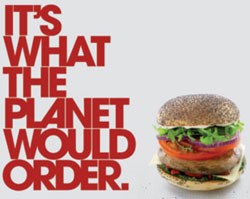When trying to communicate information about the environment to consumers, it often pays to relate big picture ideas to every day relevant situations. Carbon footprints have become the new yard-stick by which we measure our impact on the planet, and while many people might not understand the calculations behind the measurement, most people would be generally aware that the smaller the footprint, the better.
Unfortunately, environmentally friendly restaurants have a slight image problem. The very idea creates outdated images of nut roasts, folk music and restaurants fitted out in a very "rustic" décor.
Challenging the boundaries
Otarian has set out to change all that as a new boutique quick-service restaurant chain and retail brand built on a sustainable platform. Based on the principles of vegetarianism and its benefits to human health and the well being of all living creatures and the environment, the first Otarian outlets opened in New York with more scheduled to open in London during 2010.
Otarian has set out to challenge the boundaries of current eating habits, with a new benchmark in sustainable business practices. All decisions about Otarian's food and operations are made with sustainability in mind. All Otarian dishes have a lower carbon foot print than comparable meat based dishes.
Set meals that maximise carbon savings have been devised - Carbon Saving Combos - provide at least 3 kg carbon savings when compared to equivalent meat-based dishes. (3kg of carbon per week would offset 20% of the carbon created by a typical Brit's daily food consumption.) None of the ingredients are transported by air, and almost all the restaurant waste is composted or recycled. Most of the shops are fitted out with recycled materials.
It's all in the Karma
Consumers can join the Carbon Karma loyalty scheme that rewards "ethical eating" with Carbon Karma points. These points can be exchanged for dessert items from the menu. Carbon information appears alongside each item on the menu, to help customers understand the implications of their food choices.
Otarian founder Radhika Oswal is a vegetarian and committed environmentalist, who is determined that the complete Otarian supply chain causes minimal environmental impact, "Vegetarianism is the most sustainable and environmentally conscious way of eating and being," she says.
"Vegetarian foods have a lighter ecological footprint, reduced water impacts and lower carbon emissions than non-vegetarian equivalents. With Otarian I hope to show that food can be delicious and good for the planet; if each vegetarian meal saves even one kilogram of carbon emissions or grain, or one litre of water or oil - the cumulative benefits of Otarian eating can change the planet's current trajectory."








